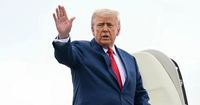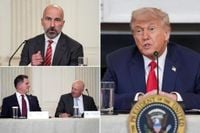On June 9, 2025, President Donald Trump championed a new initiative aimed at giving American children a financial head start from birth. At a White House roundtable attended by lawmakers and top CEOs, Trump introduced the "Trump Savings Account" program, a key component of the GOP's sweeping "One Big Beautiful Bill." This program proposes that the federal government deposit $1,000 into a tax-deferred, low-cost index fund account for every newborn child, with additional private contributions allowed up to $5,000 annually.
Trump emphasized the program's potential impact, stating, "The Trump Accounts, as they call it, pilot program, which will make it possible for countless American children to have a strong start in life, at no cost to the American taxpayer. Absolutely no cost. It's gonna have a huge impact." He further described it as a "pro-family initiative that will help millions of Americans harness the strength of our economy to lift up the next generation." The accounts would be controlled by the children's guardians, ensuring parental oversight while providing a financial foundation for future milestones such as college tuition or a home down payment.
The eligibility for these accounts extends to children born between January 1, 2025, and December 31, 2028. The funds will be invested in a low-cost index fund that tracks the overall stock market, allowing the accounts to grow alongside the economy. Trump remarked, "They'll really be getting a big jump on life, especially if we get a little bit lucky with some of the numbers and the economies into the future." This optimistic outlook aligns with research cited by the administration, which suggests that children with savings accounts are more likely to graduate high school and college, purchase homes, start businesses, and are less likely to face incarceration.
House Speaker Mike Johnson hailed the policy as "bold" and "transformative," underscoring its role in providing every eligible American child with a financial head start from day one. He stated, "Republicans are proud to be the party we always have been that supports life and families and prosperity and opportunity. And Trump accounts are all about setting up the next generation for success. For future Americans, this early investment could really be the game-changer." Johnson also pointed out the legislative journey, noting that the House passed the bill after 14 months of deliberations, while the Senate faces a much more compressed timeline.
The program was unveiled during the "Invest America" roundtable held in the State Dining Room of the White House, which brought together influential CEOs from major corporations. Attendees included Dell Technologies CEO Michael Dell, Altimeter Capital CEO Brad Gerstner, ARM Corp CEO Rene Haas, Salesforce co-founder Parker Harris, ServiceNow CEO William McDermott, Uber CEO Dara Khosrowshahi, Goldman Sachs CEO David Solomon, and Robinhood CEO Vladimir Tenev. These business leaders expressed strong support for the initiative, recognizing its potential to foster long-term economic growth and social mobility.
Michael Dell pledged his company's commitment, announcing, "We will proudly match dollar for dollar the government’s seed investment into these accounts for all the children born to Dell team members." Such corporate participation highlights the private sector's role in bolstering this public policy, creating a partnership aimed at empowering families and communities.
Despite the enthusiasm, the bill faces challenges in the Senate, where some Republican senators have voiced concerns about the potential increase in the federal deficit. Senators Ron Johnson (R-Wis.), Rand Paul (R-Ky.), Rick Scott (R-Fla.), and Mike Lee (R-Utah) have indicated reluctance to support the legislation, citing its projected trillions in added debt. Given the narrow 53-47 Republican majority in the Senate, the bill could fail if more than three senators defect.
President Trump expressed confidence in the bill's passage, urging Congress to send it to his desk by July 4, 2025. "It’s going to go pretty quickly," he predicted, reflecting his administration's determination to enact the "One Big Beautiful Bill." White House Press Secretary Karoline Leavitt emphasized the bill's comprehensive benefits, stating, "The passage of the One Big Beautiful Bill will literally change the lives of working, middle class families across America by delivering the largest tax cuts in history, increasing the child tax credit, AND by creating this incredible new 'Trump Account' program, which will put the lives of young Americans on the right financial path!"
The "Trump Account" program represents a novel approach to addressing economic inequality and fostering generational wealth. By providing a financial nest egg from birth, the initiative aims to nurture educational attainment, homeownership, and entrepreneurship among future Americans. As Trump noted, "In addition to the substantial financial benefits of investing early in life, extensive research shows that children with savings accounts are more likely to graduate high school and college, buy a home, start a business and are less likely to be incarcerated." This holistic perspective ties economic opportunity to broader social outcomes, positioning the program as a transformative tool for American families.
The event's timing and high-profile attendance underscore the administration's strategic push to build momentum for the bill amid ongoing Senate debates. By engaging CEOs who can mobilize private contributions and corporate support, the White House seeks to demonstrate bipartisan and cross-sector backing. This coalition-building effort may prove critical in overcoming legislative hurdles and ensuring the program's implementation.
As the nation watches, the "Trump Savings Account" initiative stands at the intersection of policy innovation and political negotiation. Its success or failure will shape the financial futures of millions of children and serve as a benchmark for how government and business can collaborate to foster economic opportunity from the earliest stages of life.





